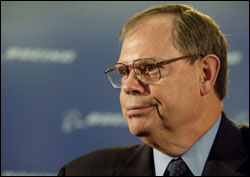New York–based Village Voice Media, which owns six weekly urban newspapers including Seattle Weekly, and New Times Newspapers of Phoenix, which owns 11, intend to merge into one company, pending approval by the U.S. Department of Justice, the companies announced Monday, Oct. 24. The privately held 17-paper chain, with a combined national circulation of 1.8 million, would retain the Village Voice Media name, but the majority owners of New Times would hold a controlling 62 percent interest and appoint five of nine board members.
The new entity would be the third out-of-town owner of Seattle Weekly since 48 local investors sold the paper eight years ago. Previous to Village Voice Media, which was formed in 2000, pet-food magnate Leonard Stern owned the Village Voice chain. Today, Village Voice Media is owned by investors represented by Goldman Sachs, Weiss, Peck & Greer, and Trimaran Capital Partners. The CEO is David Schneiderman, a former Voice editor. Besides Seattle Weekly and the Village Voice, Village Voice Media owns LA Weekly in Los Angeles, OC Weekly in Orange County, Calif., City Pages in Minneapolis, and Nashville Scene. The Voice began publishing 50 years ago and is considered the pioneer of the so-called alternative-weekly format. Seattle Weekly was founded in 1976.
New Times, in business since 1970, is largely owned by CEO James Larkin and Executive Editor Michael Lacey. Fourteen percent of the chain is held by a Boston investment firm called Alta Communications. New Times owns Phoenix New Times, Westword in Denver, SF Weekly in San Francisco, East Bay Express in Oakland, Calif., the Dallas Observer, the Houston Press, Cleveland Scene, Miami New Times, New Times Broward-Palm Beach in Florida, Riverfront Times in St. Louis, and The Pitch in Kansas City.
Larkin will serve as CEO of the new company and Schneiderman will head the combined chain’s Internet operations. Lacey will be executive editor of all 17 newspapers.
Justice Department blessing stands in the way of closing the deal, which means it could be months before anything happens. The two chains got slapped down in 2003 by the government’s antitrust regulators for colluding to create monopolies in Los Angeles and Cleveland. In 2002, before the feds intervened, Village Voice Media closed its paper in Cleveland and New Times closed its paper in Los Angeles to create mutually beneficial monopolies. Neither company admitted wrongdoing, but monetary penalties were paid, and as part of a consent decree the two companies agreed to get Justice approval for any future deals.
Rumors of the merger have been around for months, fueled in particular by heated coverage by the independently owned San Francisco Bay Guardian. The paper is fighting New Times’ SF Weekly and East Bay Express, which are squeezing the Bay Guardian for readership and ad sales, and the two companies are litigants.
If the Justice Department approves the deal, it’s unclear what sort of personality the new Village Voice Media might assume. The two chains are quite different. Among other factors (see Mossback), Village Voice Media exercises almost no editorial influence from New York on the other five papers. New Times is more involved in steering the editorial approach of its papers. For example, New Times embraces aggressive local muckraking that has been noteworthy, and its papers have won many awards. But New Times shuns traditional political coverage, its papers mostly do not publish electoral endorsements, and there is a certain sameness to many of the papers that suggests a nonlocal heritage. Lacey, the chain’s executive editor, did not return calls seeking comment.
Critics also have decried the trend of consolidation of ownership of urban weeklies generally—a trend that swept more mainstream media years ago. Among daily newspapers, the Gannett chain of some 100 papers is the biggest. It is widely regarded as a company that buys bad newspapers and makes them mediocre but also buys good newspapers and makes them mediocre. As talk of the Village Voice Media-New Times deal spread in recent months, the weekly Boston Phoenix, owned by neither company, asked Jeff Chester, executive director of the Center for Digital Democracy, what he thought. “It’s the Gannettization of the alternative press,” Chester told the Phoenix. “It’s very ironic, but not surprising, given that advertising is the business model. The same kind of forces of media conglomeration and monopolization are reshaping the alternative press.” Replied Lacey, the New Times exec editor, in a story about the rumored merger published later by SF Weekly: “I don’t know what trust fund cuts his checks, but advertising pays our bills and the bills of every single alternative newspaper. It also pays New Times writers a living wage and covers the cost of eyeglasses our kids need, medical coverage for domestic partners, paid vacations …”
In a memo over the weekend to Village Voice Media employees, CEO Schneiderman also dismissed criticism of the merger. “I am sure most of you are aware of the bizarre charge that this merger will mark the end of alternative journalism,” he wrote. “Nothing could be farther from the truth. Both Village Voice Media and New Times have earned a reputation for producing first-rate journalism. Both companies support and encourage their journalists to expose corruption, hypocrisy and incompetence wherever they find it. It defies logic to assert that those traditions will be undermined or abandoned as a result of this merger. In fact, I fully expect them to be strengthened.
“Over 20 years ago when I was editor of the Voice, Rupert Murdoch was the improbable owner,” Schneiderman wrote. “It would be an understatement to say that we did not see eye to eye on most issues. He once said to me that he could not understand how a bunch of Communists could manage a paper so well. I responded that we had concluded that if we did a good job, we might live to publish another issue of the Voice. Ironically, when Leonard Stern acquired the Voice from Murdoch in 1985, many of us including me, viewed this with trepidation. Stern, however, turned out to be a great owner. I offer this history to acknowledge that though impending change creates uncertainty, more often than not it leads to positive results. In this case, I sincerely believe that you will come to see this merger as an opportunity to grow professionally as part of an even more dynamic company.”






